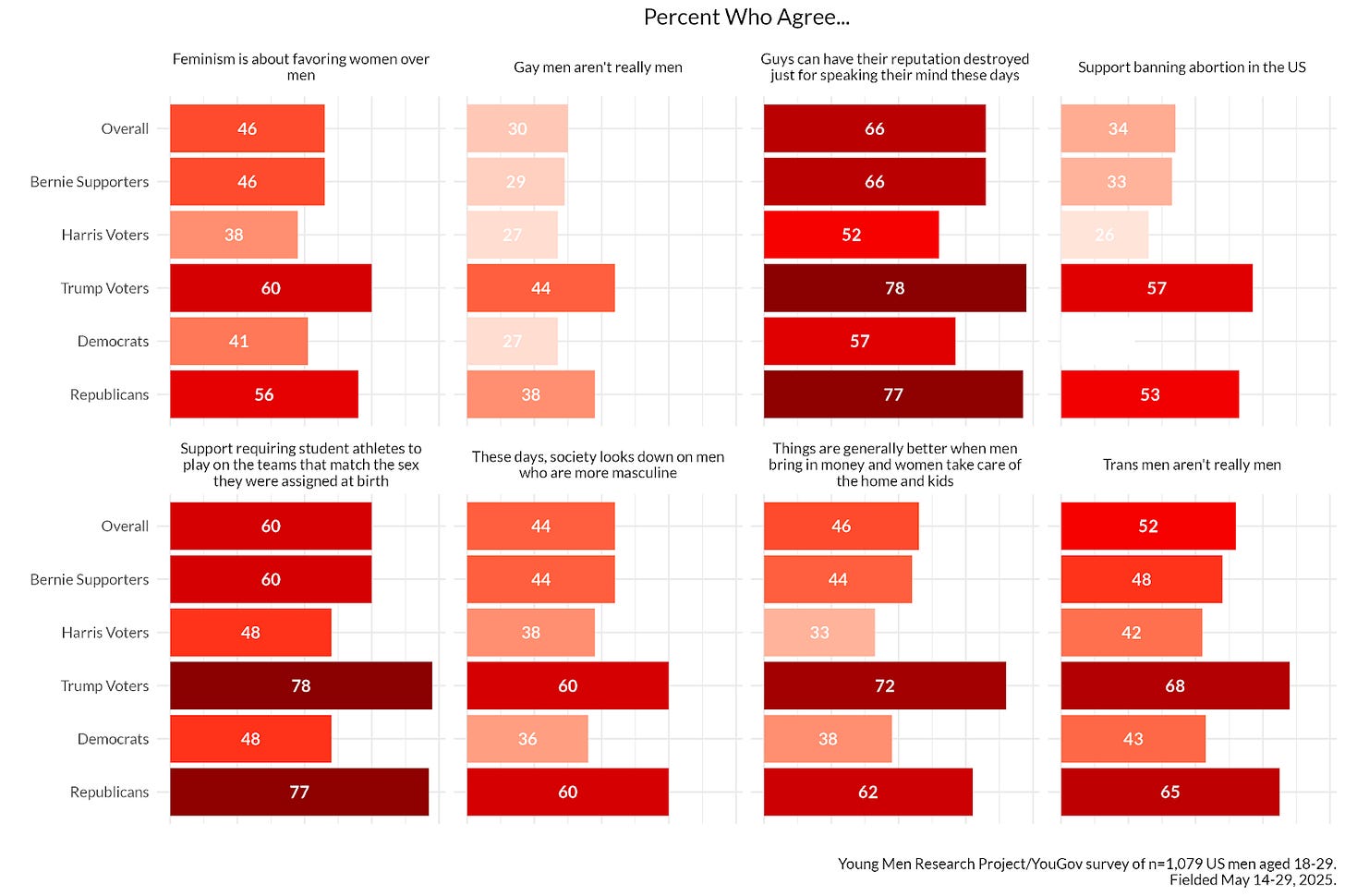They love Bernie and hate cancel culture
It’s complicated, but the Bernie Bro may be the median young man voter
The Gen Z gender gap has been the subject of intense media coverage since young men broke for Trump last November. The president’s unexpected gains stunned Democrats and fueled the narrative that his victory signaled a cultural backlash against all things “woke.”
What risks getting lost in the simple narrative of young men shifting to the right are the nuances of young men’s ideological beliefs, and where young men of different political stripes converge or diverge. In the latest Young Men Research Project (YMRP) poll, conducted by YouGov from May 14 to May 19, 18-29-year-old men in the U.S. were asked a series of questions related to gender and race.
The tables below show levels of support for a series of statements, broken down to different subgroups of respondents. The YouGov sample was weighted to match Catalist’s turnout targets, reflecting a Trump +5 electorate: 34 percent said they voted for Trump, 29 percent for Harris, one percent for a third party, and 36 percent did not vote. The percentage of unsure respondents for both grids was typically between 12 to 18 percent.
These data reveal deep concerns about so-called “cancel culture.” Overall, two-thirds of young men agree with the statement that “guys can have their reputation destroyed just for speaking their mind these days,” including 57 percent of Democrats and about three-quarters of Republicans. Age, race, and education had only marginal variation.
There is also moderate–though not majority–skepticism about feminism. Just under half (46%) of respondents believe feminism is about “favoring women over men,” with a fifteen-point gap between Democrats (41% agree) and Republicans (56%). The majority of Black young men agreed with this statement (54%), compared to 45% of White and Latino respondents. Interestingly, college-educated respondents were more likely to concur with this statement (47%) than non-college-educated respondents (43%), though differences were once again small.
A majority (60%) support requiring student athletes to play on teams that match their sex assigned at birth. Once again, this view cuts across education and age lines. Black respondents were the most receptive to restrictions on trans athletes (68% support), followed by White (60%) and Hispanic (57%) participants. While Republicans overwhelmingly back this policy (77%), nearly half (48%) of Democratic young men do as well.
Most young men (57%) also agree that society provokes racism by overemphasizing race and giving certain individuals special treatment. Once again, there is no significant difference among younger and older Gen Z members, or even between races. Republican and Democratic young men were respectively ten points above and nine points below the overall average, a noteworthy but not necessarily seismic difference.
Fans of Hasan Piker–the left-wing Turkish-American political commentator–showed stronger agreement with these questions than one might expect. 46 percent of young men who say they like and trust Piker agree that “society looks down on men who are more masculine,” compared to 44 percent overall. Additionally, 50 percent of his fans concur that feminism favors women over men (compared to 46 percent overall).
Responses from young men who like and trust Dean Withers, another progressive streamer, were more puzzling. This group was more than twice as likely as the overall average to say “Gay men aren’t really men” (62% vs 30%), and well-above the average on questions related to gender roles and feminism. An explanation for this phenomenon is unclear. While the sample size is smaller than other groups (n=103), it’s possible that those following Withers share media algorithms not unlike those influencing followers of figures like Andrew Tate or Charlie Kirk.
Young men who are in a serious relationship (gender not specified) are no more or less likely, on average, to endorse or reject these statements, contradicting any assumption that having a partner cultivates more liberal views.
Many young men are skeptical of today’s social liberalism. On the other hand, many are liberal-leaning on certain policy issues.
Only one in three young men (34%) support a national abortion ban, a figure that effectively mirrors national polling on the issue. Differences across political ideologies are clear–independents poll at 28 percent support, compared to 22 percent of Democrats and 53 percent of Republicans–yet this is similar to partisan differences on a national level.
Majorities across groups (albeit slim in some cases) agree that White people in the U.S. hold certain advantages because of their skin color, and larger shares reject the idea that racism is rare. Just 29 percent of young men overall believe racial problems in the U.S. occur in isolation; 75 percent of independents reject this view, and differences across White, Hispanic, and Black respondents are minimal. But on the question of whether certain advantages exist for White people, racial divides are more pronounced: 51 percent of White respondents agree, compared to 63 percent of Hispanic and 73 percent of Black young men. The overall 57 percent agreement closely mirrors national averages on similar questions. And while survey data on this specific item is limited, there is little indication that young White men’s views have become more reactionary in recent years. Still, this slim majority is far from a sign of racial reckoning and underscores continued polarization on the matter.
Young men identifying as Democrats and Republicans deviate more sharply from the sample averages on social and racial issues than any age, racial, or educational group. In fact, the “Bernie bro” may be most representative of young men. This shouldn’t come as a surprise–Sanders was the most popular political figure we polled. As we outlined in a recent post, he has +22 net favorability among young men, outpacing any other politician surveyed. This includes +57 standing among Democrats, +26 with independents, and even +10 among Trump voters.
On nearly every measure–from cancel culture to masculinity to feminism–young men who view Sanders favorably align almost identically with the full sample’s averages. The only meaningful departure is that his supporters are more likely than Harris or Trump voters, or members of either party, to say that White people receive advantages because of their skin color. These young men backing Bernie may roll their eyes at wokeness– they’re more concerned with bread-and-butter issues like inflation and the cost of housing.
For Democratic strategists looking to moderate the party socially, these results may come as welcome news. For Republicans, this presents yet more reason to tie the Democratic brand with cancel culture. The reality is that young men’s views defy easy categorization–anyone hoping to reach them must start from here.
At YMRI, we are committed to researching and understanding how the political and cultural beliefs of young men evolve, intersect, and interact.









